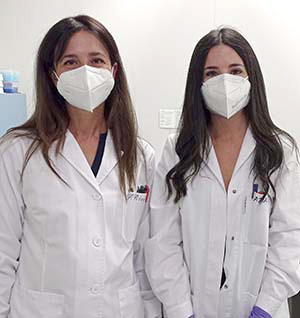A new biomaterial for the recovery of muscle injuries
The new hydrogel is capable of regenerating damaged muscle very rapidly -specifically, in half the time it takes for it to regenerate naturally
[ 31/03/2021 ]
A team from the Universitat Politècnica de València (UPV) and the CIBER Bioengineering, Biomaterials and Nanomedicine (CIBER-BBN) has designed and tested, at a preclinical level, a new biomaterial for the treatment and recovery of muscle injuries. It is a boron-loaded alginate hydrogel, which would be administered with a subcutaneous injection. According to the tests carried out so far –in animal models–, it is capable of regenerating damaged muscle very rapidly –specifically, in half the time it takes for it to regenerate naturally.
The scientific advance could also be applied to the prevention and treatment of muscle atrophy associated with aging. The results of the work of these Spanish researchers have been published in the journal Materials Science & Engineering C.
The key to the high performance of this biomaterial lies in the release of boron, with which the hydrogel is loaded in a simple way. When released, it stimulates the integrins –proteins which are present in all cells of the body and play a fundamental role in the adhesion of cells to the extracellular matrix–, which generates a correct formation of tissues.
According to the UPV and CIBER-BBN team, the simultaneous stimulation of the integrins that bind fibronectin and the boron ion transporter (NaBC1) significantly improves muscle regeneration at the anatomical level. It does so because it induces a greater number of adhesions, and of greater size, in undifferentiated muscle cells, which are those that participate in muscle regeneration after an injury, which ultimately favours the formation of differentiated myotubes that are necessary for the correct creation of new regenerating muscle fibres.
“In the tests that we have carried out in our laboratories after inducing an acute injury with cardiotoxin (cobra snake venom) in mice, the activation of NaBC1 accelerated the process of muscle regeneration. We verified that, by adding boron to damaged muscle cells, their level of adhesion increased, and now they adhered in a faster and more robust way, allowing the muscle to regenerate in a shorter period of time”, adds Dr. Patricia Rico, researcher at the CIBER-BBN at the Centre for Biomaterials and Tissue Engineering of the Universitat Politècnica de València.
Thus, this work suggests a simple and novel way to achieve muscle regeneration through the interaction between specific receptors on the cell membrane. “If, for example, a second degree fibrillar tear takes 30 days to regenerate, the use of our hydrogel reduces the recovery time to 15 days," remarks Patricia Rico.
Dr. Rico’s team is currently working on the study of the application of this new biomaterial to the treatment of muscular dystrophies such as Duchenne muscular dystrophy, a rare inherited disease that affects 1 in 100,000 children. “Our objective is to assess the possibilities of our system for the treatment of this dystrophy, which usually manifests between two and three years of age and which, being a degenerative disease, drastically reduces the life expectancy of these children," concludes Patricia Rico.
References
“Borax-loaded injectable alginate hydrogels promote muscle regeneration in vivo after an injury”. Jesús Ciriza, Ana Rodríguez-Romano, Ignacio Nogueroles, Gloria Gallego-Ferrera, Rubén Martín Cabezuelo, José Luis Pedraza, Patricia Rico. Materials Science and Engineering: C, Volume 123, April 2021, 112003. https://doi.org/10.1016/j.msec.2021.112003
Outstanding news
 ARWU 2023
ARWU 2023
The Shanghai ranking reaffirms the UPV as the best polytechnic in Spain for yet another year
 Science Meets Regions CV 2023
Science Meets Regions CV 2023
The UPV and the Almussafes City Council begin a collaboration in search of solutions to maintain the automobile sector in the Valencia Region
 Scientific reference
Scientific reference
Avelino Corma, Distinguished Research Assistant at the UPV, awarded an Honorary Doctorate by the University of Huelva
 Micronanofabs NTC UPV-PERTE CHIP Conference
Micronanofabs NTC UPV-PERTE CHIP Conference
María Marced, TSMC Europe president: "The sector's future is bright, the market is expected to double by 2030"
 Goya nomination
Goya nomination
Javier Polo, who holds a degree in Audiovisual Communication from the UPV, directs the successful short documentary Una terapia de mierda
 Sant Carles Medal 2023
Sant Carles Medal 2023
The Faculty of Fine Arts of the UPV awards the Sant Carles Medal 2023 to outstanding Valencian art and culture figures







